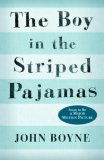Summary | Excerpt | Reading Guide | Reviews | Beyond the Book | Readalikes | Genres & Themes | Author Bio

A Fable
by John Boyne
‘Yes, of course,’ said Bruno, nodding his head, because there were always so many visitors to the house — men in fantastic uniforms, women with typewriters that he had to keep his mucky hands off — and they were always very polite to Father and told each other that he was a man to watch and that the Fury had big things in mind for him.
‘Well, sometimes when someone is very important,’ continued Mother, ‘the man who employs him asks him to go somewhere else because there’s a very special job that needs doing there.’
‘What kind of job?’ asked Bruno, because if he was honest with himself — which he always tried to be — he wasn’t entirely sure what job Father did.
In school they had talked about their fathers one day and Karl had said that his father was a greengrocer, which Bruno knew to be true because he ran the greengrocer’s shop in the centre of town. And Daniel had said that his father was a teacher, which Bruno knew to be true because he taught the big boys who it was always wise to steer clear of. And Martin had said that his father was a chef, which Bruno knew to be true because he sometimes collected Martin from school and when he did he always wore a white smock and a tartan apron, as if he’d just stepped out of his kitchen.
But when they asked Bruno what his father did he opened his mouth to tell them, then realized that he didn’t know himself. All he could say was that his father was a man to watch and that the Fury had big things in mind for him. Oh, and that he had a fantastic uniform too.
‘It’s a very important job,’ said Mother, hesitating for a moment. ‘A job that needs a very special man to do it. You can understand that, can’t you?’
‘And we all have to go too?’ asked Bruno.
‘Of course we do,’ said Mother. ‘You wouldn’t want Father to go to his new job on his own and be lonely there, would you?’
‘I suppose not,’ said Bruno.
‘Father would miss us all terribly if we weren’t with him,’ she added.
‘Who would he miss the most?’ asked Bruno. ‘Me or Gretel?’
‘He would miss you both equally,’ said Mother, for she was a great believer in not play-ing favourites, which Bruno respected, especially since he knew that he was her favourite really.
‘But what about our house?’ asked Bruno. ‘Who’s going to take care of it while we’re gone?’
Mother sighed and looked around the room as if she might never see it again. It was a very beautiful house and had five floors in total, if you included the basement, where Cook made all the food and Maria and Lars sat at the table arguing with each other and calling each other names that you weren’t supposed to use. And if you added in the little room at the top of the house with the slanted windows where Bruno could see right across Berlin if he stood up on his tiptoes and held on to the frame tightly.
‘We have to close up the house for now,’ said Mother. ‘But we’ll come back to it someday.’
‘And what about Cook?’ asked Bruno. ‘And Lars? And Maria? Are they not going to live in it?’
‘They’re coming with us,’ explained Mother. ‘But that’s enough questions for now. Maybe you should go upstairs and help Maria with your packing.’
Bruno stood up from the seat but didn’t go anywhere. There were just a few more questions he needed to put to her before he could allow the matter to be settled.
‘And how far away is it?’ he asked. ‘The new job, I mean. Is it further than a mile away?’
‘Oh my,’ said Mother with a laugh, although it was a strange kind of laugh because she didn’t look happy and turned away from Bruno as if she didn’t want him to see her face. ‘Yes, Bruno,’ she said. ‘It’s more than a mile away. Quite a lot more than that, in fact.’
Excerpted from The Boy in the Striped Pajamas by John Boyne Copyright © 2006 by John Boyne. Excerpted by permission of David Fickling Books, a division of Random House, Inc. All rights reserved. No part of this excerpt may be reproduced or reprinted without permission in writing from the publisher.
It is among the commonplaces of education that we often first cut off the living root and then try to replace its ...
Click Here to find out who said this, as well as discovering other famous literary quotes!
Your guide toexceptional books
BookBrowse seeks out and recommends the best in contemporary fiction and nonfiction—books that not only engage and entertain but also deepen our understanding of ourselves and the world around us.